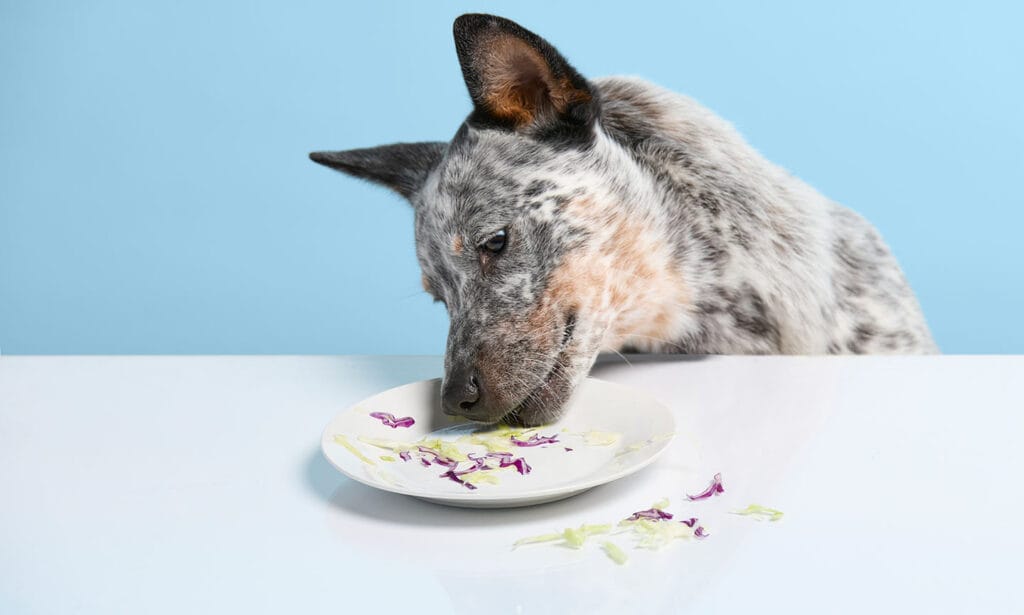Cats can eat cabbage, but it should be given in moderation. Cabbage is safe for felines, offering vitamins and fiber.
Cabbage, the leafy green often associated with a healthy human diet, can also be a nutritious addition to your cat’s meal plan. While it’s not a necessary part of their diet, when fed in small quantities, cabbage can be a healthy snack that provides roughage and essential nutrients.
It’s crucial to introduce this vegetable slowly to your pet’s diet to avoid digestive upset and to always serve it cooked, as raw cabbage can be harder for cats to digest. Ensuring your feline friend’s overall dietary needs are met with a balanced, meat-based diet is essential, with cabbage being only an occasional treat. Remember, moderation is key to keep your curious cat both happy and healthy.
Contents
Understanding A Cat’s Dietary Needs
Cats are obligate carnivores, meaning their diet must primarily consist of meat to thrive. Unlike omnivores that can easily digest both plant and animal products, cats have a digestive system designed to process protein-rich diets. It’s essential for cat owners to understand that their feline friends require specific amino acids, such as taurine, found primarily in meat. While a small amount of plant-based foods like cabbage can be included for variety, it’s important to ensure that such foods do not disrupt the balance of their meat-centric nutritional intake.
| Nutrient | Importance | Primary Source |
| Protein | Builds muscle and supports bodily functions | Meat, fish, eggs |
| Fats | Provides energy and supports cell growth | Animal fats, fish oils |
| Taurine | Essential for vision and heart health | Meat, particularly heart and liver |
Feeding cats a well-balanced diet appropriate for their carnivorous nature is crucial for their health. While vegetables like cabbage are not harmful and can even provide beneficial antioxidants, they should only be offered in moderation and not replace a significant portion of their animal-based meals.
Exploring The Benefits And Risks
Cats can safely consume cabbage, which is packed with essential nutrients like vitamin K, vitamin C, and dietary fiber. The fiber content aids in digestion, thus potentially improving a cat’s gastrointestinal health. Vitamin K is crucial for healthy blood clotting, and vitamin C supports the immune system, although cats produce this vitamin on their own.
Despite its benefits, caution is necessary when feeding cabbage to cats. Large quantities may cause gas or gastrointestinal upset. It’s important to note that cabbage also contains isothiocyanates, which can lead to hypothyroidism if consumed in excessive amounts. As obligate carnivores, cats require a diet high in protein, and cabbage should only be a supplement to their primary food source.
Introduce cabbage into a cat’s diet gradually, starting with small, well-cooked portions to minimize potential risks. Raw cabbage is tougher for cats to digest, hence it’s preferable to offer it steamed or boiled. Always consult a veterinarian before making significant changes to your cat’s diet to ensure it aligns with their specific dietary needs.
Expert Insights And Recommendations
Cats are obligate carnivores, which means their diet typically consists of mostly meat. Yet, owners may want to offer variety with vegetables such as cabbage. It’s crucial to consult a veterinarian before introducing new foods to your cat’s diet. While cabbage is not toxic to cats, it should only be given in small quantities. Large amounts can cause digestive upset.
Considering alternative vegetables? Opt for steamed carrots or pumpkin, which can be easier for cats to digest and contain beneficial nutrients. Steamed green beans can also be a safe snack in moderation. Always remember that these should only make up a small portion of the cat’s diet alongside high-quality cat food.

Credit: be.chewy.com
Frequently Asked Questions On Can Cats Eat Cabbage? You Won’t Be-leaf Your Eyes
Is Cabbage Safe For Cats To Eat?
Yes, cabbage is safe for cats in small quantities. It contains vitamins and can add fiber to their diet. However, it should be given in moderation, as too much can cause gas or affect the thyroid.
What Benefits Does Cabbage Offer To Cats?
Cabbage offers antioxidants, fiber, and vitamins K and C to cats. These nutrients can support digestion and the immune system. But remember, it should only be a small part of a balanced diet.
Can Cabbage Cause Health Issues In Cats?
Cabbage can cause gas and potentially impact thyroid function if consumed in large amounts. Cats with known health issues should consult a vet before introducing cabbage into their diet.
How Should I Introduce Cabbage To My Cat’s Diet?
Introduce cabbage slowly, starting with a small cooked piece. Observe for any adverse reactions or digestive upsets. If none occur, it can be given occasionally in moderation.
Conclusion
To sum it up, felines can indeed enjoy cabbage as part of a balanced diet. Just start with small amounts to ensure there’s no adverse reaction. Always remember to consult your vet before introducing new foods to your cat’s menu.
Your whiskered friend’s health is always the top priority. Keep those greens coming, in moderation!

Katie Lindsey is a passionate cat lover and founder of Cats Solution, a comprehensive resource for all things feline. With a lifelong love for cats and extensive knowledge in their care and behavior, she provides expert advice and solutions to cat owners. Through her website, Katie fosters a supportive community where cat enthusiasts can find guidance and heartwarming stories. A dedicated advocate for animal welfare, Katie also promotes responsible pet ownership and adoption. Join her on this purr-fect journey celebrating the joy of feline companionship.

